Buying expired domain names in the USA presents various legal considerations, such as the risk of trademark infringement and copyright issues. It is essential to understand these potential pitfalls to avoid costly legal disputes and ensure compliance with applicable laws. Additionally, researching the ownership history of an expired domain can help mitigate risks and align the domain with your business objectives.
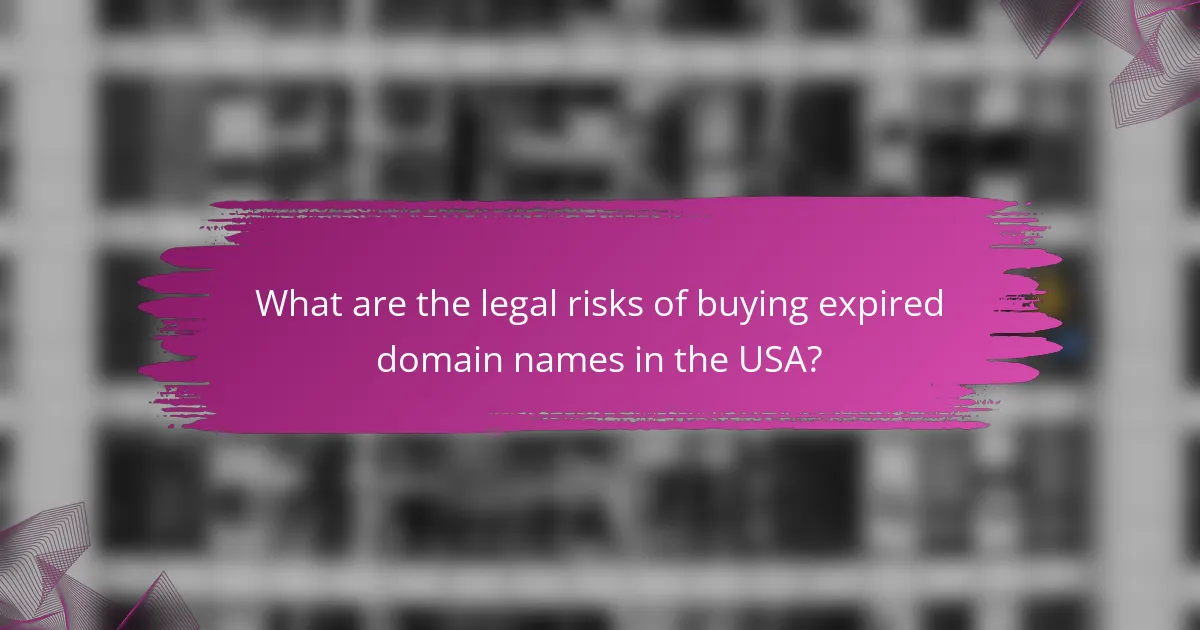
What are the legal risks of buying expired domain names in the USA?
Buying expired domain names in the USA carries several legal risks, including potential trademark infringement, copyright issues, and the possibility of legal disputes. Understanding these risks is crucial to avoid costly mistakes and ensure compliance with relevant laws.
Trademark infringement
Trademark infringement occurs when a domain name is similar to a registered trademark, potentially leading to confusion among consumers. If the expired domain name you purchase is closely related to a well-known brand, the trademark owner may take legal action to reclaim it.
To mitigate this risk, conduct thorough research on existing trademarks before acquiring a domain. Tools like the United States Patent and Trademark Office (USPTO) database can help identify potential conflicts.
Copyright issues
Copyright issues can arise if the expired domain name is associated with copyrighted content, such as images, text, or videos. If you plan to use the domain for a website, ensure that you are not infringing on any copyrights by using existing content without permission.
To avoid copyright problems, consider creating original content or obtaining licenses for any materials you wish to use. This proactive approach can save you from legal complications down the line.
Potential for legal disputes
Legal disputes may occur if the previous owner of the expired domain name or third parties claim rights to it. This can lead to costly litigation and the potential loss of the domain. It’s essential to verify the domain’s history and any previous ownership claims before making a purchase.
Utilizing domain history checkers and services that provide insights into past ownership can help you assess the likelihood of disputes. Additionally, consider consulting with a legal professional specializing in intellectual property to navigate these complexities effectively.
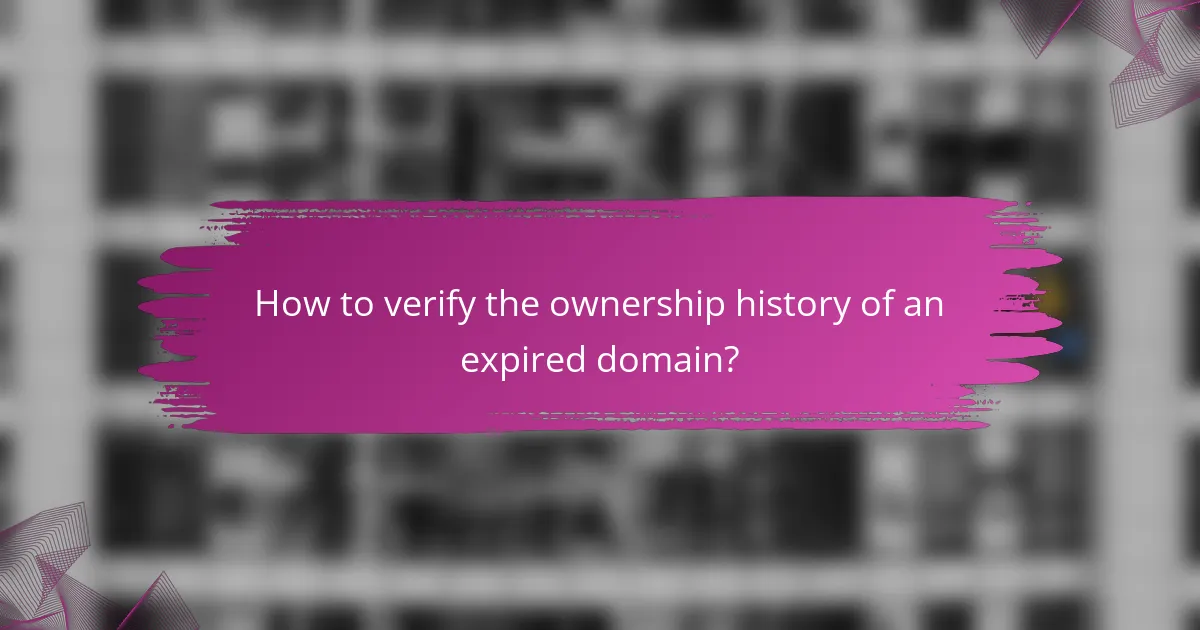
How to verify the ownership history of an expired domain?
To verify the ownership history of an expired domain, you can utilize various online tools and resources that provide insights into past ownership and usage. Understanding this history is crucial to avoid potential legal issues and ensure that the domain aligns with your intended use.
Use WHOIS lookup tools
WHOIS lookup tools allow you to access the registration details of a domain, including its previous owners and registration dates. By entering the expired domain name into a WHOIS database, you can see the historical ownership records, which may include contact information and the registrar used.
Common WHOIS lookup services include ICANN WHOIS, WHOIS.net, and DomainTools. Be aware that some domains may have privacy protection enabled, which can obscure the owner’s details. In such cases, you might need to contact the registrar for more information.
Check historical data with Wayback Machine
The Wayback Machine is a digital archive that captures snapshots of websites over time. By entering the expired domain into the Wayback Machine, you can view how the site appeared in the past and understand its content and purpose. This can help you determine if the domain was associated with any controversial or illegal activities.
To use the Wayback Machine, visit archive.org/web and input the domain name. You can then navigate through the timeline to see different versions of the site. This historical context can be valuable in assessing the domain’s reputation and potential risks before making a purchase.
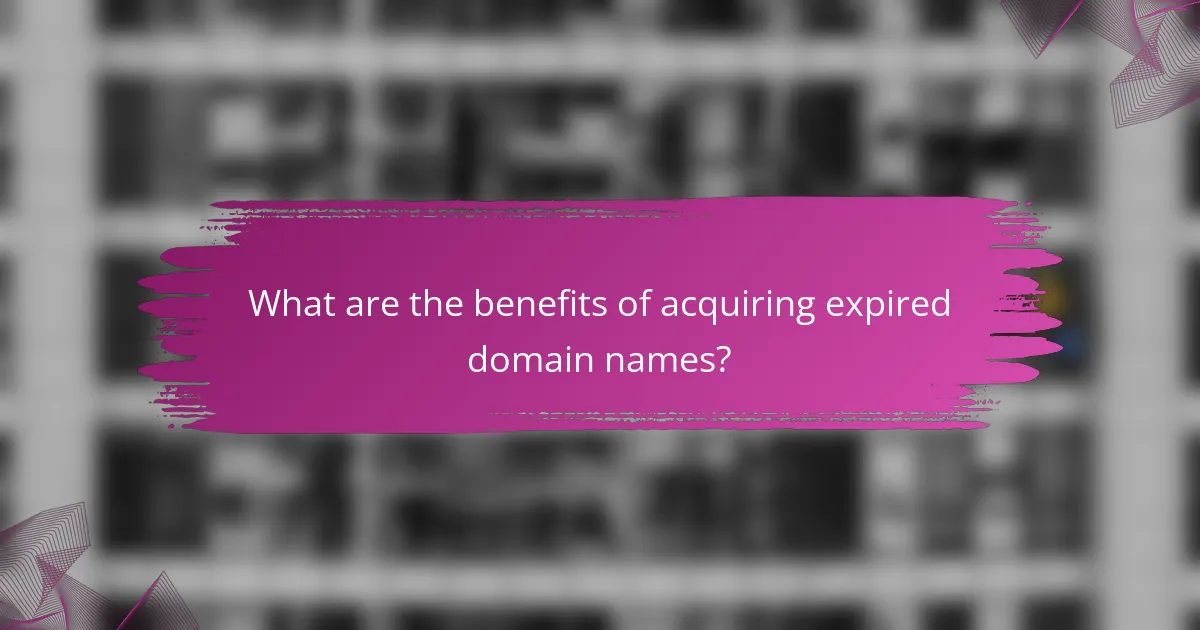
What are the benefits of acquiring expired domain names?
Acquiring expired domain names can offer several advantages, including improved search engine optimisation (SEO), access to established backlinks, and enhanced brand recognition. These benefits can significantly impact online visibility and business growth.
SEO advantages
Expired domain names often come with existing authority and trust, which can boost your website’s SEO performance. Search engines tend to favour domains with a history, making it easier for new content to rank higher in search results.
When considering an expired domain for SEO, check its previous rankings and traffic levels. Tools like Ahrefs or SEMrush can provide insights into the domain’s past performance, helping you make an informed decision.
Established backlinks
One of the key benefits of expired domains is the presence of established backlinks. These links from other reputable sites can drive traffic and enhance your site’s credibility in the eyes of search engines.
Before purchasing, analyse the quality of the backlinks using tools like Moz or Majestic. Focus on domains with high domain authority and relevant links to ensure they contribute positively to your SEO strategy.
Brand recognition
Acquiring an expired domain can help you leverage existing brand recognition. If the domain was previously associated with a well-known brand or service, it may come with a built-in audience.
To maximise this benefit, ensure that the domain aligns with your current business goals and target audience. A domain that resonates with users can lead to quicker trust and engagement, ultimately driving conversions.
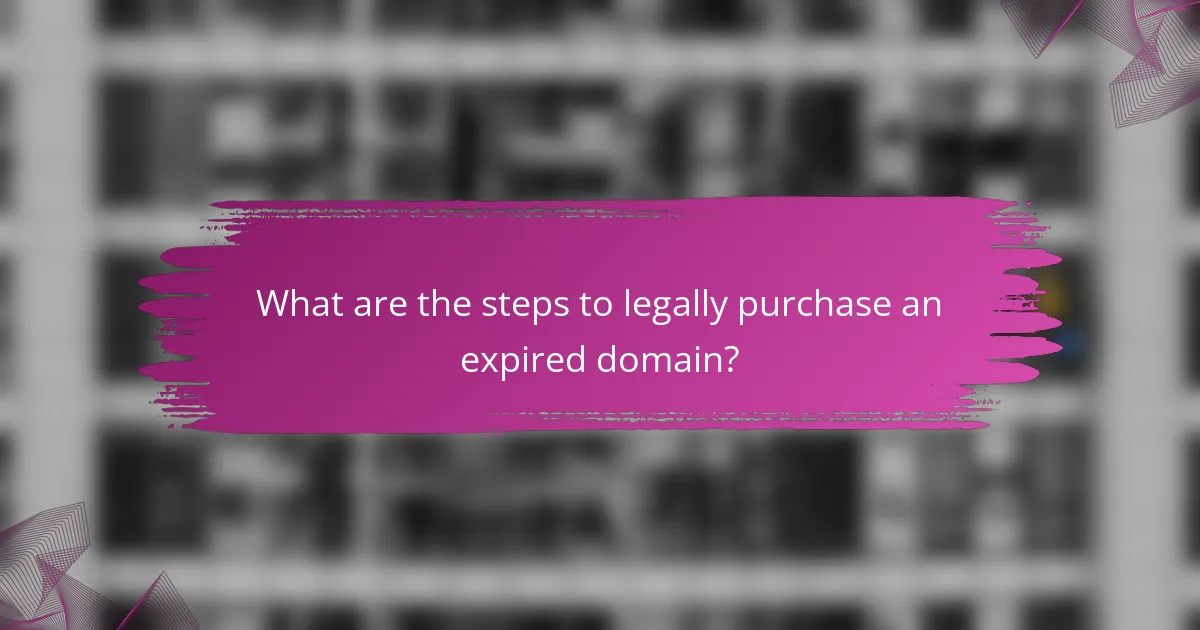
What are the steps to legally purchase an expired domain?
To legally purchase an expired domain, you need to follow a series of steps that ensure the domain is free from legal issues and properly transferred to your ownership. This process includes researching the domain’s history, consulting with a legal expert, and completing the transfer process correctly.
Research the domain’s history
Understanding the history of an expired domain is crucial to avoid potential legal complications. Check for any previous ownership disputes, trademark issues, or negative associations that could affect your use of the domain.
Utilise tools like the Wayback Machine to view past content and services associated with the domain. This can provide insights into its reputation and any potential liabilities.
Consult with a legal expert
Before finalising your purchase, consult with a legal expert who specializes in intellectual property or internet law. They can help you navigate any legal risks associated with the domain, including trademark infringements or potential claims from previous owners.
A legal expert can also assist in drafting any necessary agreements to protect your interests during the transfer process. This step is essential to ensure that you are fully informed of your rights and obligations.
Complete the transfer process
Once you have verified the domain’s history and consulted with a legal expert, proceed with the transfer process. This typically involves purchasing the domain through a registrar and ensuring that the previous owner releases their rights.
Make sure to update the domain’s registration details, including your contact information, and consider enabling domain privacy protection to shield your personal information. Follow the registrar’s specific instructions to avoid any delays or issues during the transfer.
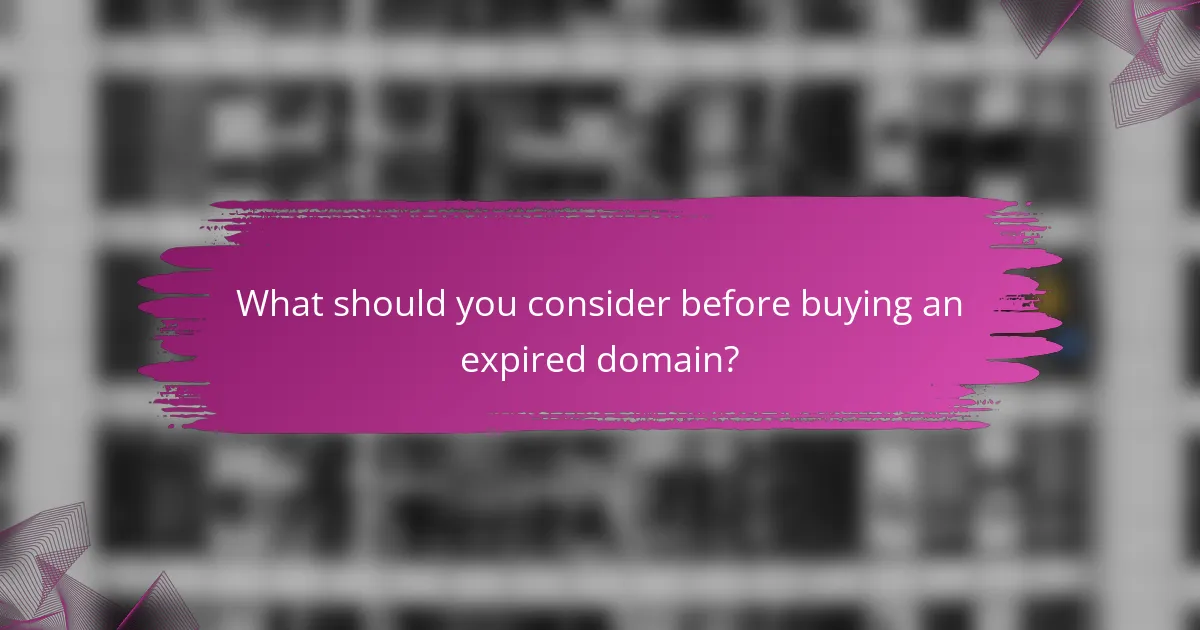
What should you consider before buying an expired domain?
Before purchasing an expired domain, assess its relevance to your business, previous ownership, and any potential legal issues. Understanding these factors can help you make an informed decision and avoid future complications.
Domain relevance to your business
The relevance of an expired domain to your business is crucial for maximizing its value. A domain that closely aligns with your industry or target audience can enhance your SEO efforts and brand recognition. For example, a domain related to health and wellness would be more beneficial for a fitness brand than a generic name.
Consider the keywords in the domain name and how they relate to your products or services. Domains that contain popular search terms may attract more organic traffic, making them a worthwhile investment.
Previous ownership and usage
Investigating the previous ownership and usage of an expired domain is essential to avoid potential pitfalls. Use tools like the Wayback Machine to view past content and check for any negative associations or penalties from search engines. A domain with a history of spammy content could harm your reputation and SEO efforts.
Additionally, verify the domain’s registration history through WHOIS databases. This can provide insights into how many times it has changed hands and whether it has been previously blacklisted or flagged for malicious activity.
Potential legal implications
Legal issues can arise when purchasing an expired domain, especially if it was previously associated with a trademarked name or business. Conduct a trademark search to ensure that the domain does not infringe on existing trademarks, which could lead to costly legal disputes.
Be aware of the potential for cybersquatting claims, where a trademark owner may assert rights over a domain that is similar to their brand. This could result in losing the domain or facing legal action, so thorough due diligence is critical before making a purchase.
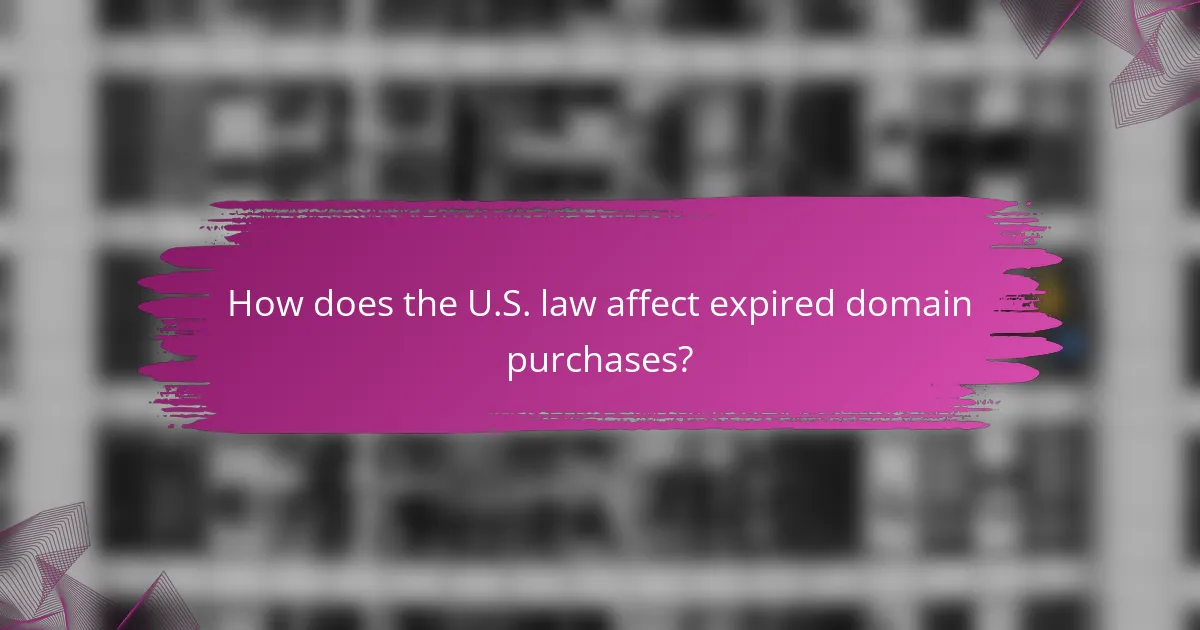
How does the U.S. law affect expired domain purchases?
U.S. law significantly impacts the purchase of expired domain names, particularly regarding trademark rights and state regulations. Buyers must navigate these legal considerations to avoid potential disputes and ensure compliance.
Federal trademark laws
Federal trademark laws protect brand names and logos that distinguish goods and services. When purchasing an expired domain, it is crucial to check if the domain name is similar to an existing trademark, as this could lead to legal challenges or claims of infringement.
To avoid issues, conduct a trademark search through the United States Patent and Trademark Office (USPTO) database. If a trademark exists, consider choosing a different domain name to mitigate the risk of legal action.
State-specific regulations
Each state may have its own regulations regarding domain names, including laws on cybersquatting and unfair competition. These laws can vary widely, so it’s essential to understand the specific rules in the state where you plan to operate.
For example, some states have enacted laws that specifically address the registration of domain names that are similar to local businesses. Familiarising yourself with these regulations can help you avoid costly legal disputes and ensure your domain purchase is compliant.
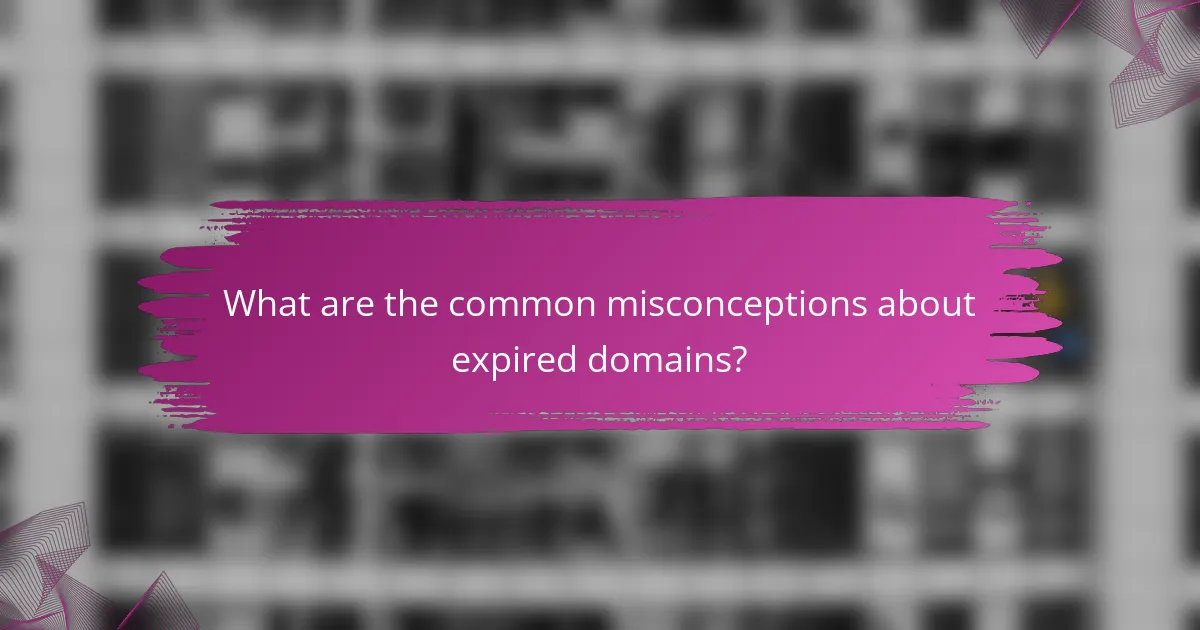
What are the common misconceptions about expired domains?
Many people believe that expired domains are always valuable and can be easily monetised. However, the reality is that not all expired domains hold significant worth, and their value can vary greatly based on several factors.
All expired domains are valuable
It is a common misconception that every expired domain has inherent value. In truth, the worth of an expired domain depends on its history, traffic, backlinks, and relevance to current market trends. Some domains may have been previously associated with spam or low-quality content, which can diminish their value.
When considering an expired domain, evaluate its metrics such as Domain Authority (DA), Page Authority (PA), and the quality of its backlinks. Tools like Ahrefs or Moz can provide insights into these metrics, helping you determine if a domain is worth pursuing.
Additionally, be cautious of domains that are overly generic or have no specific niche. While they may seem appealing, they often lack the targeted audience necessary for successful monetisation.
